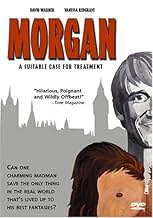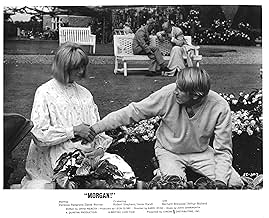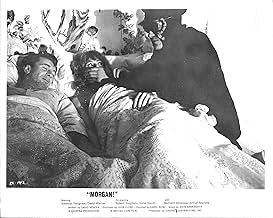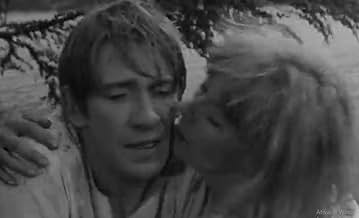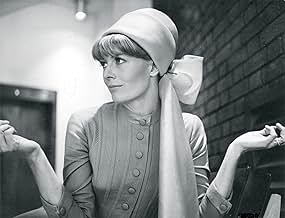NOTE IMDb
6,5/10
2,2 k
MA NOTE
Ajouter une intrigue dans votre langueAfter his wife leaves him for his former best friend, a failed London artist begins his descent into madness in trying to win her back.After his wife leaves him for his former best friend, a failed London artist begins his descent into madness in trying to win her back.After his wife leaves him for his former best friend, a failed London artist begins his descent into madness in trying to win her back.
- Réalisation
- Scénario
- Casting principal
- Nommé pour 2 Oscars
- 4 victoires et 12 nominations au total
Angus MacKay
- Best Man
- (as Angus Mackay)
Jack Armstrong
- Guest at Wedding Reception
- (non crédité)
Bernard Barnsley
- Workman
- (non crédité)
Avis à la une
I've always had something of an ambivalent attitude towards the British "Swinging London" films of the 1960s: sometimes I enjoy their creative technique and anything-goes approach, while other times I find their brashness exasperating and extremely dated. Actually, MORGAN is now among the films I've revisited the most among them (more by accident than design) which has led me to toy with the idea of compiling a list of titles from that era - comprising above all films I've watched only once, or not at all, but also those which I haven't checked out in ages (some of which are in my endless "DVDs To Watch" pile).
Anyway, the film itself is certainly one of the most engaging of the lot: basically an update of the typical Hollywood 'screwball comedy' formula, with one member of a divorced couple disrupting the new marriage plans of the other, though here we don't get the conventional happy ending. Reisz was, along with Lindsay Anderson and Tony Richardson, one of the founding members of the "Free Cinema" movement; though he started at the very top with Saturday NIGHT AND Sunday MORNING (1960), the rest of his career was rather spotty with MORGAN being perhaps its closest in quality - even if the unflinching realism of the former had, by this time, given way to irreverent comic fantasy!
While the plot is somewhat thin and the lead character's pranks to reclaim his wife become repetitive, the film's hectic pace never wavers; stylish, amusing (particularly when dealing with Morgan's Communist background and his obsession with gorillas!) and bolstered by John Dankworth's playful score, it's delightfully enacted by the three principals - David Warner (the role of his life), Vanessa Redgrave (the recipient of many accolades, including a surprising Best Actress Oscar nomination) and Robert Stephens - none of whom are typically associated with slapstick (though David Mercer's script also offers perceptive comments about the painful consequences of a broken marriage).
Anyway, the film itself is certainly one of the most engaging of the lot: basically an update of the typical Hollywood 'screwball comedy' formula, with one member of a divorced couple disrupting the new marriage plans of the other, though here we don't get the conventional happy ending. Reisz was, along with Lindsay Anderson and Tony Richardson, one of the founding members of the "Free Cinema" movement; though he started at the very top with Saturday NIGHT AND Sunday MORNING (1960), the rest of his career was rather spotty with MORGAN being perhaps its closest in quality - even if the unflinching realism of the former had, by this time, given way to irreverent comic fantasy!
While the plot is somewhat thin and the lead character's pranks to reclaim his wife become repetitive, the film's hectic pace never wavers; stylish, amusing (particularly when dealing with Morgan's Communist background and his obsession with gorillas!) and bolstered by John Dankworth's playful score, it's delightfully enacted by the three principals - David Warner (the role of his life), Vanessa Redgrave (the recipient of many accolades, including a surprising Best Actress Oscar nomination) and Robert Stephens - none of whom are typically associated with slapstick (though David Mercer's script also offers perceptive comments about the painful consequences of a broken marriage).
In 1966 when I lived in London I fully expected to see this movie. Many of my friends, especially the girls, were raving about it. Funds diverted to beer, or girls, deprived me of the chance. So it has taken me nearly forty years to actually see it. Thoroughly of the time, and yet it must have seemed so radical even then. I watched it as a chaser to Alfie (Michael Caine) and it was interesting to compare the styles of two icons of British female acting, Redgrave and Asher, in one evening. Both movies dealt with serious and potentially unattractive issues; adultery, abortion, promiscuity and mental illness and injected enough humor into the screenplay to keep ones attention the while. I am prompted to revisit "Up the Junction" and " A Taste of Honey" with Rita Tushingham, another sixties icon.
Although a classic cult film of the 60's, this film, when studied properly, has its definite faults.
David Warner is one of my favourite actors. He often appears in minor roles nowadays and gives the leads great support with his excellent performances, and his position down the cast list does enable him to be offered a wide range of characters. However, this has caused him to be one of the most underrated actors around today and unlike his English equivalents (John Hurt, Ian Holm, etc.) he has never been really appreciated enough by those outside the UK. It was with great interest, therefore, that I was given a chance to see one David Warner's first films after "Tom Jones" (1963), "Morgan, A Suitable Case for Treatment," a film adapted from a television play by writer David Mercer, in which Warner takes for the only time in his career, the definite title role in a movie, starring alongside then-first-timer Vanessa Redgrave.
Warner plays Morgan Delt, a barely sane man who has just had a divorce from his beautiful wife, Leonie (Redgrave), much to his secret dismay. As a consequence, Morgan begins to sabotage Leonie's second marriage to his former-best-friend Charles Napier (Robert Stephens), attempting various types of distractions which are characteristic of the man himself. He plays sounds from records to disturb the couple at dinner, re-wires Leonie's house, dresses up as a gorilla, and even plants bombs during a brief visitation from Leonie's mother. Soon he begins to dream, mostly about his obsession with gorillas but also of his mock execution, he believes himself to not only to be insane but also illegal.
This depiction of madness, however, barely works at all, the adaptation of this story from television to screen being probably the main reason for it. The acting is fine, Redgrave is brilliant and Warner, perfectly cast for once in his career, is superb, the supporting cast are also impressive, including a nice cameo from actress Irene Handl as Morgan's mother, it's just that the film doesn't quite work. "A Suitable Case for Treatment" does have some hilariously funny moments which are highly memorable in fact, but the film as a general whole doesn't succeed. See it if you can, but expect some disappointment.
Warner plays Morgan Delt, a barely sane man who has just had a divorce from his beautiful wife, Leonie (Redgrave), much to his secret dismay. As a consequence, Morgan begins to sabotage Leonie's second marriage to his former-best-friend Charles Napier (Robert Stephens), attempting various types of distractions which are characteristic of the man himself. He plays sounds from records to disturb the couple at dinner, re-wires Leonie's house, dresses up as a gorilla, and even plants bombs during a brief visitation from Leonie's mother. Soon he begins to dream, mostly about his obsession with gorillas but also of his mock execution, he believes himself to not only to be insane but also illegal.
This depiction of madness, however, barely works at all, the adaptation of this story from television to screen being probably the main reason for it. The acting is fine, Redgrave is brilliant and Warner, perfectly cast for once in his career, is superb, the supporting cast are also impressive, including a nice cameo from actress Irene Handl as Morgan's mother, it's just that the film doesn't quite work. "A Suitable Case for Treatment" does have some hilariously funny moments which are highly memorable in fact, but the film as a general whole doesn't succeed. See it if you can, but expect some disappointment.
I thought the movie hilarious in '66 and still do. Of course, I can see why social conservatives take offense since the movie basically mocks settled convention. For example, when a gorilla-clad Morgan crashes the wedding party, it's like the intrusion of primal instinct on all that's refined and holy. But even more troubling, movie communists are portrayed as almost likably human, instead of the usual weasels or monsters of Hollywood lore. For Americans, that took real getting used to then, and I expect still does.
Reviewer screaminmimi is, I think, spot-on in her commentary. Still, I want to venture a perspective on Morgan's weird behavior since he's such a fascinating character, for me, at least. He's like a believer who's lost faith—he keeps the Marxist icons on his car, but in his heart no longer believes in the revolution. Instead, as the dialog indicates, the weight of mindless convention is crushing his sensitive nature. What's more, despair is really rubbed in when Leonie leaves him for the asinine Napier, the epitome of the unworthy, in Morgan's eyes, at least.
So, having given up on politics and despising the conventional, he retreats into the fantastic, non-human world of the gorilla by taking on the alter-ego of the primitive, which he then uses to pursue his ex-wife. In Morgan's mind maybe Leonie will respond to the magnetism of the primitive by bellowing out his call. So he conducts his wacky efforts at winning her back by donning a gorilla costume, and we get some of the movie's loonier comedic set-ups.
Consider also that great scene at Marx's bust in Highgate when the camera plays up the over-hanging brow and ape-like visage. Morgan responds with an ape-like grunt, which Mom construes as disrespect. It's not. In fact, with that grunt he's incorporated the political into his new primitive fantasy. It's only later on, atop the trash heap, when he's lost Leonie and given up his gorilla alter-ego, that the political suddenly reasserts itself and with a vengeance. At that point, he imagines himself executed by Marxist guerrillas, perhaps in guilt over not fulfilling the Leninist expectations others had for the young Morgan. Defeated in so many ways, he's now ready to be carted off to the loony bin, but not without a lingering spark.
Of course, there's also Leonie, the trigger of his desperation. She's really torn since she responds to Morgan's rebellious nature, on one hand, but is used to the conventional comforts of her prosperous class, on the other. It's clear that she's attracted to him, but can't take living with such an unpredictable cuss. So she retreats back to the prospect of the conventional with Napier. Asked by Morgan, at one point, why she prefers the conventional, she's perplexed and can't really answer, as if she's never actually thought about it. So, not only does Morgan lose out to convention, he loses out to a bunch of rules for which there's no apparent reason.
The movie itself is very much in the emerging hip style of the day. Director Reisz films in brash, take no prisoners fashion, unafraid of breaking the rules. His cast of Warner and Redgrave are perfect for their roles. She looks every inch the well-kept daughter and wife who occasionally likes to let her hair down, while he manages a complex role in persuasive fashion.
To me, the comedy set-ups are funny as heck, though one might question the explosive set- up under the bed. Still, I take Morgan's assault on the upper-class as akin to the Marx Bros. irreverent brand of humor in the 1930's. In fact, some of his antics could be likened to Harpo Marx's absurd stage props at a time when the brothers wreaked havoc among that day's well upholstered.
Sure, some of the cinematic style may look outdated. But neither the laughs nor the targets are. To me, they endure. After fifty years, Morgan is still an exceptional movie.
Reviewer screaminmimi is, I think, spot-on in her commentary. Still, I want to venture a perspective on Morgan's weird behavior since he's such a fascinating character, for me, at least. He's like a believer who's lost faith—he keeps the Marxist icons on his car, but in his heart no longer believes in the revolution. Instead, as the dialog indicates, the weight of mindless convention is crushing his sensitive nature. What's more, despair is really rubbed in when Leonie leaves him for the asinine Napier, the epitome of the unworthy, in Morgan's eyes, at least.
So, having given up on politics and despising the conventional, he retreats into the fantastic, non-human world of the gorilla by taking on the alter-ego of the primitive, which he then uses to pursue his ex-wife. In Morgan's mind maybe Leonie will respond to the magnetism of the primitive by bellowing out his call. So he conducts his wacky efforts at winning her back by donning a gorilla costume, and we get some of the movie's loonier comedic set-ups.
Consider also that great scene at Marx's bust in Highgate when the camera plays up the over-hanging brow and ape-like visage. Morgan responds with an ape-like grunt, which Mom construes as disrespect. It's not. In fact, with that grunt he's incorporated the political into his new primitive fantasy. It's only later on, atop the trash heap, when he's lost Leonie and given up his gorilla alter-ego, that the political suddenly reasserts itself and with a vengeance. At that point, he imagines himself executed by Marxist guerrillas, perhaps in guilt over not fulfilling the Leninist expectations others had for the young Morgan. Defeated in so many ways, he's now ready to be carted off to the loony bin, but not without a lingering spark.
Of course, there's also Leonie, the trigger of his desperation. She's really torn since she responds to Morgan's rebellious nature, on one hand, but is used to the conventional comforts of her prosperous class, on the other. It's clear that she's attracted to him, but can't take living with such an unpredictable cuss. So she retreats back to the prospect of the conventional with Napier. Asked by Morgan, at one point, why she prefers the conventional, she's perplexed and can't really answer, as if she's never actually thought about it. So, not only does Morgan lose out to convention, he loses out to a bunch of rules for which there's no apparent reason.
The movie itself is very much in the emerging hip style of the day. Director Reisz films in brash, take no prisoners fashion, unafraid of breaking the rules. His cast of Warner and Redgrave are perfect for their roles. She looks every inch the well-kept daughter and wife who occasionally likes to let her hair down, while he manages a complex role in persuasive fashion.
To me, the comedy set-ups are funny as heck, though one might question the explosive set- up under the bed. Still, I take Morgan's assault on the upper-class as akin to the Marx Bros. irreverent brand of humor in the 1930's. In fact, some of his antics could be likened to Harpo Marx's absurd stage props at a time when the brothers wreaked havoc among that day's well upholstered.
Sure, some of the cinematic style may look outdated. But neither the laughs nor the targets are. To me, they endure. After fifty years, Morgan is still an exceptional movie.
A film that acheives what it sets out to be. It is an immature and unreasonable storyline that takes no account for anyones feelings but those of our hero, Morgan... But 1966 was a time of big brush strokes, not subtle pointers. Most of the situations and characters are cardboard and stereotypical, but done with a sense of style and flair that allows you not to get bogged down in it all. When at the end of the film, the seemingly battered and beaten Morgan still has the clenched fist of rebellion, it's time for a hot cocoa and then off to bed clutching Das Kapital in your rebellious mitts, with a wistful smile on your face for the simple values of yesteryear, when it was good versus evil. I gave it 9 0ut of 10. Very watchable and great fun
Le saviez-vous
- AnecdotesVanessa Redgrave's Best Actress Oscar nomination for this movie coincided with sister Lynn Redgrave's similar nomination for Georgy Girl (1966). Such a coincidence had occurred only once before when sisters Joan Fontaine and Olivia de Havilland respectively vied for the Best Actress Oscar for Soupçons (1941) and Par la porte d'or (1941).
- GaffesCrew reflected in the window of the car that Leonie gets into at the start of the film.
- Citations
Morgan Delt: [to Leoni] Do you really want little Napiers growing inside you?
- ConnexionsEdited from King Kong (1933)
Meilleurs choix
Connectez-vous pour évaluer et suivre la liste de favoris afin de recevoir des recommandations personnalisées
- How long is Morgan!?Alimenté par Alexa
Détails
- Durée
- 1h 37min(97 min)
- Couleur
- Rapport de forme
- 1.66 : 1
Contribuer à cette page
Suggérer une modification ou ajouter du contenu manquant


